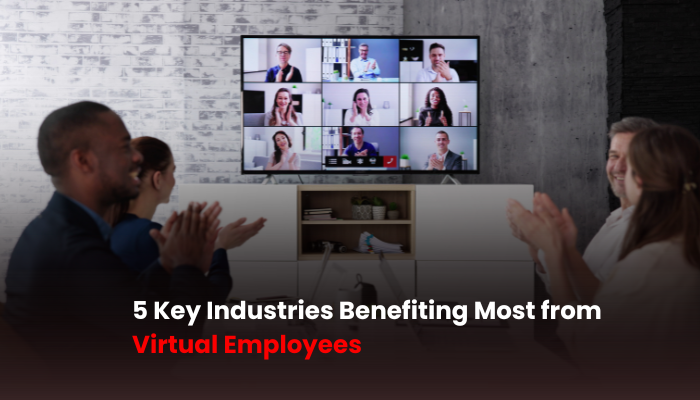Efficiency isn’t just a buzzword—it’s a strategic necessity. As businesses seek cost-effective ways to scale, the Virtual Employee model is gaining undeniable momentum. Beyond being a fleeting trend, this approach to remote staffing is transforming how industries manage operations, optimize budgets, and access talent globally. But which sectors are truly reaping the rewards?
Let’s unpack the five key industries that are not only adapting to this model but thriving because of it.
1. Virtual Employee in Information Technology (IT)
Technology has always been at the forefront of remote evolution. IT companies were among the earliest adopters of the Virtual Employee model, using it to bridge skill gaps and manage tight deadlines without expanding physical infrastructure.
Why IT Leads the Way:
-
Global Talent Pool: Specialized roles in software development, QA, and cybersecurity can be filled rapidly.
-
24/7 Productivity: Time zone differences translate into a continuous workflow.
-
Cost Reduction: Companies sidestep the overhead of on-site teams while accessing elite technical expertise.
Tasks Virtual Employees Handle in IT:
-
Web and app development
-
Server maintenance and tech support
-
Data analytics and AI model training
This approach lets startups compete with tech giants by leveling the playing field with affordable yet skilled teams.
2. Virtual Employee in Digital Marketing
Creativity doesn’t require cubicles. From content creation to SEO strategies, marketing teams are discovering how powerful a Virtual Employee can be in driving visibility and growth.
Key Benefits for Marketing Firms:
-
Scalability: Easily expand or contract the team based on campaign demands.
-
Diverse Skill Sets: Hire specialists in SEO, PPC, content marketing, and analytics.
-
Real-Time Collaboration Tools: Slack, Trello, and HubSpot bridge physical gaps effortlessly.
Common Virtual Roles:
-
Social media managers
-
Content writers and graphic designers
-
SEO and email marketing specialists
With the added advantage of creative minds across borders, brands are building global voices through their virtual marketing arms.
3. Virtual Employee in E-Commerce and Retail
Retail has gone digital, and so have its teams. E-commerce platforms are leveraging Virtual Employees to streamline operations, from customer service to inventory management.
How E-commerce Benefits:
-
24/7 Customer Support: A distributed workforce ensures round-the-clock assistance.
-
Order Processing Efficiency: VAs manage logistics, returns, and order entries.
-
Product Listing & Optimization: Enhance visibility with keyword-rich, attractive listings handled remotely.
Notable Use Cases:
-
Virtual product photographers/editors
-
Chat support agents and order managers
-
Review moderation and influencer outreach
Even solo-preneurs can now run a full-fledged online store with a lean virtual team supporting the backend.
4. Virtual Employee in Healthcare and Wellness
This may surprise you, but yes—the healthcare sector is embracing the Virtual Employee model. While patient care must remain in-person, administration and coordination are now often managed remotely.
Where Healthcare Benefits Most:
-
Medical Billing and Coding: Certified virtual professionals manage insurance claims and billing records.
-
Telehealth Coordination: Schedule appointments and manage patient data securely.
-
Health Content Creation: Nutritionists and trainers offer virtual consultations and generate educational content.
Types of Roles Hired Virtually:
-
Medical transcriptionists
-
Virtual medical receptionists
-
Online fitness coaches and dieticians
Virtual staffing is reducing burnout and improving service delivery without compromising patient confidentiality or service quality.
5. Virtual Employee in Finance and Accounting
Precision, privacy, and promptness define the finance industry—and all three can thrive with the right Virtual Employee in place.
Why the Finance Sector is Onboard:
-
Cost-Efficiency: Access top-tier financial minds without full-time executive costs.
-
Flexible Engagements: Scale according to fiscal quarters or audit seasons.
-
Data Security: With proper compliance and tools, remote finance teams ensure full data confidentiality.
Virtual Finance Roles:
-
Bookkeepers and payroll managers
-
Financial analysts and auditors
-
Tax preparers and consultants
With financial health being a pillar of business growth, hiring smartly and securely through virtual channels is a winning formula.
Why More Businesses Should Hire a Virtual Employee
There’s no longer a one-size-fits-all approach to staffing. Businesses are now unshackled from geographic constraints and reaping the efficiency, flexibility, and affordability of virtual teams.
Top Reasons to Hire a Virtual Employee:
-
Reduces operational costs by up to 60%
-
Enables rapid scaling without physical expansion
-
Enhances productivity with focused task allocation
-
Brings access to global skillsets and multilingual support
To hire a virtual employee, you can explore services from Invedus Outsourcing, a trusted name for delivering skilled, pre-vetted remote professionals. Their customizable staffing solutions make onboarding seamless and efficient. Visit Invedus to browse available profiles and tailor your team as per your project needs.
Final Words
The paradigm has shifted. Businesses now value agility, digital fluency, and global collaboration—and the Virtual Employee fits all three like a glove. From IT and finance to healthcare and retail, this staffing solution is reshaping what it means to build a successful, scalable team.
For those ready to embrace this future-forward model, hiring a Virtual Employee through Invedus Outsourcing could be the game-changing move that accelerates your business goals.
Read This Website For More Information: insidetechie.xceltec.in
 :
https://www.pinterest.com/inveduss/
:
https://www.pinterest.com/inveduss/

